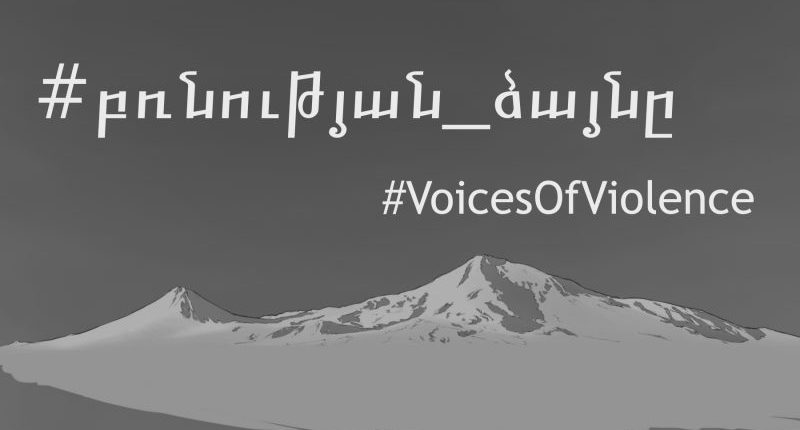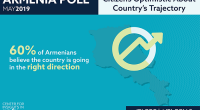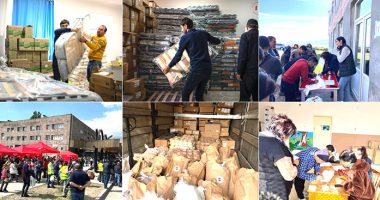Written by Karena Avedissian
First published at GlobalVoices.org
“Voices of Violence”: the new hashtag has prompted public debate about sexualized violence in Armenia. Image by Tom Venner.
Warning: This article features accounts of sexual assault which some readers may find disturbing.
On Monday, July 1, an independent Armenian journalist named Lucy Kocharyan began posting anonymous personal accounts of sexual harassment and violence on her Facebook page. By the end of the day on July 2, more than 200 stories had been shared and the associated hashtag, #բռնության_ձայնը (or “voice of violence” in English), became the highest trending in Armenia.
The campaign developed after a case of sexual assault against a Czech woman named Eva was published by investigative news outlet Hetq.am. Eva, who lived in Armenia for one year, had been volunteering in Vanadzor, the country’s third-largest city, when she survived an attack and attempted rape. After escaping her attacker, she sought shelter in neighbors’ homes, but was pushed out and told that “it is impossible for such a thing to happen in Armenia.”
Eva’s story is significant not just for the social problems it unveiled — specifically victim-blaming and widespread denial of the problem—but because Eva pursued justice and her attacker was sentenced to three years in prison.
After Kocharyan posted about Eva’s story on Facebook, she was approached by Armenian women who wanted her to show the public that sexual violence is not just experienced by foreign women in the country, but by Armenian women too. These women also wanted to fight the stereotype that Armenian women are not outspoken, and started to send Kocharyan their personal accounts of sexual assault, which Kocharyan published anonymously on her Facebook page. In an unexpected turn, members of the public — mostly women, but also men — trusting Kocharyan’s journalistic credentials and her ability to keep their identities confidential, began sending her their stories and asking her to share them. The wave of sharing grew, propelling the topic to the forefront of the Armenian public’s attention.
Kocharyan’s campaign was supported publicly by at least two members of government: Minister of Labor and Social Affairs Zara Batoyan, and Minister of Health Arsen Torosyan. The journalist was interviewed by various news outlets about the campaign, including CivilNet, Radio Free Europe/Radio Liberty Azatutyun, and Petros Ghazarian, who hosts a popular political discussion show.
However, some parts of Armenian society are skeptical about the veracity of the stories being shared; they find it hard to believe that so many incidents could have actually happened in Armenia, especially those where the abuser is a family member. For example Sofya Hovsepyan, a member of parliament from Armenia’s ruling My Step Coalition, criticized the campaign on her Facebook page for creating what she considers an unfairly negative image of Armenia. Kocharyan has responded to such skepticism in interviews, saying that “sexual harassment happens in every society, including ours; our specific challenge is what we do about it afterwards.” As journalist Samson Martirosyan said on his Facebook page, the sheer number of stories emerging is hard for people to accept as they were truly unaware of the problem’s existence; nevertheless, he continued, they would have to accept reality at some point.
The more than 200 stories shared document all kinds of sexual abuse and harassment. There are stories of abuse from relatives, classmates, romantic partners, and strangers. Most of the testimonies were from women, but some men shared theirs as well, expressing the hope that their experiences would show that men are also subjected to sexualized violence.
Kocharyan vetted and fact-checked all the stories, and in some cases reached out to the authors to verify certain details. Kocharyan says that she was surprised by the response, especially as she had not made any announcement or calls for contributions. She sees the sharing as self-motivated, and a sign that those who reached out to her just wanted to be heard.
The campaign could be likened to an Armenian #MeToo. It has forced a very public questioning of what lies beneath the surface of idealistic understandings of Armenian society, how power operates in Armenia’s traditional and patriarchal society, why many people have not come forward sooner, what obligation broader society has to survivors, and what constitutes consent. Moreover, it has highlighted the importance of an effective law enforcement that can respond to individuals facing abuse and pursue perpetrators.
Perhaps the most significant aspect of this campaign has been the overwhelmingly positive reaction from the Armenian public. While Kocharyan has deleted comments that ridicule the survivors and blocked their authors, readers’ comments still overwhelmingly validate the horror that the survivors experienced, expressing compassion and support.
If nothing else, this campaign has given rise to a new community in Armenia: a community of those who believe and support survivors of abuse and who will neither ignore nor suppress of such incidents. This was demonstrated after one particularly harrowing account of a woman who was abused as a child by her mother’s partner.
After describing the abuse, the woman wrote, “Now I want to die every day. I want to ask him, why did you do that to me, why did you ruin a little girl’s life? Why did you cause me so much pain? I was a small, pretty, curly-haired, brave and strong child. Why did you turn me into a such an exhausted, frightened coward?”
The first comment beneath the testimony reads:
“Curly-haired girl, I want you to be reborn.”
Read four stories from Kocharyan‘s Facebook page below:
One young woman writes:
«15 տարեկան էի, շփվում էի ինձնից 2-3 տարի մեծերի հետ:
ընկերներիցս մեկի ծնունդն էր, 18 ամյակը որոշել էր փաբում նշեր, ես էլ ուրախացա որ ինձ մեծի տեղ են դրել կանչել
գնացի, ծանոթացա իր ընկերների հետ, բարձր երաժշտություն էր, ալկոհոլ, իսկ ես չէի խմում: մի տղա առանձահատուկ ուշադրություն էր ինձ դարձնում, անընդհատ ուզում էր խմեի, իսկ ինձ դա տհաճ էր, որոշեցի որ տուն գնալուս ժամանակնա:
հատուկ քննադատողների համար, չէ կարճ յուբկայով չէի, խմած չէի, ծխած չէի, տարիքս էլ բոլորը գիտեին: գնացի զուգարան, ինձ հարդարեմ ու գնամ տուն: իմ հետևից նա մտավ, ես սկսեցի վախենալ, իսկ ինքը մոտենում էր ավելի, ու ժպտում: գրկեց ինձ, ես լացում էի, ձեռքերով խփում, փորձում ազատվել: գոռում էի, բայց երաժշտությունն էր բարձր թե ինչ, տենց էլ ոչ ոք չեկավ:
ու վերջում եղավ բռնաբարությունը, իսկ ես կույս էի: նա արյունը տեսավ, վախեցավ: մազերս քաշեց ասեց «մեկը իմացելա կոկորդդ կկտրեմ, հասկացար?»:
ընտանիքս չիմացավ, ոչ ոք չիմացավ: դե որտև մայրս կասեր ես եմ մեղավոր, ինչի եմ գնացել ընդեղ: իսկ ես էդ դեպքից հետո 3 ամիս տանից դուրս չեկա:
փորձեցի ինքնասպան լինեմ, դեղեր խմեցի: արթնացա հիվանդանոցում, իսկ տնեցիք կարծեցին որ ուղղակի հիմար դեռահաս եմ որը որոշելա մեռնել:
անցավ գնաց: բոլորի հետ կապը կտրեցի, տղամարդկանց շրջանցում էի, չէի խոսում հետները: 2 տարի անց սկսեցի աշխատել որ հոգեբանի գնալու փող ունենամ, էլ ապրել չէի ուզում:
փորձում էի գեղեցիկ չհագնվեմ,չշպարվեմ, որ չնկատվեմ:
4 տարի անց, քիչ քիչ հաղթահարեցի վախս տղաների հետ շփվելու: բայց մեկա, շատ շատ լարված եմ, երբ շուրջս քիչ վստահելի տղամարդիկ կան:
շնորհակալ եմ որ հնարավորություն ունեցա թեկուզ 5 տարի անց կիսվելու: էն ինչ դու անում ես էս ամենը բարձրաձայնելով աննկարագրելիա»։
“I was 15 and was friends with people who were two to three years older than me. It was one friend’s 18th birthday; they were celebrating in a pub. I was happy that they treated me like I was their age and invited me. I went and met their other friends. There was loud music and alcohol, but I didn’t drink. One boy seemed interested in me and he kept wanting me to drink, but drinking was unpleasant for me, so I decided it was time to go home. For the judgmental people out there: no, I was not wearing a short skirt, I was not drunk, I was not smoking, and everyone there knew my age. I went to the toilet to wash up and go home.
That boy entered the toilet after me. I was frightened, and he kept getting closer to me and smiling. He embraced me and I was already crying, hitting him with my fists, trying to break free. I was screaming, but I suppose the music was too loud and no one came. He raped me. I was a virgin. When he saw the blood, he became frightened. He pulled my hair and said, “If anyone finds out I’ll cut your throat. Understood?” My family never found out, no one found out. Because my mother would have said that it was my fault: “Why did you go there?”
I didn’t leave the house for three months. I tried to kill myself. I overdosed on pills and woke up in the hospital. My family thought I was just a stupid teenager who decided to die. I cut off ties with everyone, I avoided men, and I didn’t speak to them. Two years later, I found a job so that I could afford to see a psychologist because I didn’t want to live. I tried to not dress up, to not be cheerful, to not be noticed. It’s now been four years and I am gradually overcoming my fear of interacting with men. But still, I am very, very anxious when there are men I don’t trust around me. Thank you for the opportunity to share this story. What you are doing is incredible.”
— Lucy Kocharyan, Facebook, July 3, 2019
Another woman described abuse she suffered as a child:
«Ես 8տարեկան էի, մենք վարձակալներ ունեինք մեր բակում,կին ու ամուսին,միշտ իրանց հետ խոսում էի, իրանք էլ իբր ինձ շատ էին սիրում , որովհետև խելոք երեխա էի, դաստիարակված))))
Մի անգամ իրանց տան մոտով անցնում էի ամուսինը ասեց արի քեզ բան եմ ցույց տալիս, գնացի(որովհետև ինձ սովորեցրել էին, որ մեծերին չի կարելի հակաճառել) հարցրեցի բա կինն ուր ա, ասեց հեսա կգա։” Տես մեր առաստաղին ինչքան ճանճեր կան, վերցրու ես շլյոպկան ու ինձ օգնի սատկացնենք” վերցրեցի, ինձ գրկեց, իբր որ բոյս հասնի….գրկել էր տուտուզից, ու սկսեցի զգալ իրա մատերը ոտքերիս արանքում, ու զգում էի որ մի բան են չի ,զզվելի ժպիտով ինձ էր նայում ու ծանր շնչում, ասեցի ուզում եմ իջնեմ,գնամ դասերս չեմ արել, իջեցրեց նստեցրեց իրա գիրկը ու սկսեց վիզս համբուրել,զզվելի ծանր շնչելով ու ասում էր գիտես քեզ ինչքան եմ սիրում, քեզ ինչքան եմ սիրում…,
ես իջա , ու փախա….գնացի տուն, երևի դեմքիս լրիվ գրված էր, մամաս ասեց ուր էիր, ասեցի…”բայց կինը տանը չի…Ինչ գործ ունեիր ամուսնու հետ մենակ…” , “ինձ գրկել էր ու ճանճերին էինք սատկացնում..” , ես ինձ ետ ամենին մասնակից էի զգում, ոնց որ թե ես էի մեղավոր ու ետ տխմար հետ գաղտնի զզվել պակտի մեջ էի….են ինչ ասեց մամաս ինձ վերջնականապես համոզեց նրա մեջ , որ ես էի մեղավոր եղածի մեջ, ասեց “ԼԿՏԻ” ու են հայացքը որով նայեց մամաս, երբեք չեմ մոռանա…երբեք…»։
“I was 8 years old, we had lodgers in our yard – a husband and wife… I always spoke to them, and they supposedly liked me a lot, because I was a well behaved child))))
One day I was walking by their house and the husband said ‘Come here, I want to show you something,” and I went (because I was taught to obey my elders). I asked, ‘Where is your wife?’ He said, ‘She’s coming home now. See how many flies are on the ceiling? Grab the fly swatter and help me kill them.’ I took the swatter and he held me to lift me up. He was holding me by my butt, and I began to feel his fingers between my legs, and I could sense that something was not right. He was looking at me with a disgusting smile and breathing heavily. I said that I wanted to come down so that I could go and do my homework. He let me down and sat me on his lap and began kissing my neck with his disgusting heavy breathing, telling me, ‘You know how much I like you…’
I came down and ran home. Maybe everything was written on my face because my mother asked me where I was, and I told her. She said, ‘But his wife is not home. What business do you have alone with that man?’ I said, ‘He was holding me and we were killing flies.’ I felt like an accomplice in the incident, as though it was my fault, and that I was in a secret, disgusting pact with that stupid man. What my mother said to me convinced me of that; that what happened was my fault.
She said ‘PERVERT’, and I will never forget the look on her face. Ever.”
— Lucy Kocharyan, Facebook, July 3, 2019
This man recollected an incident from when he was a teenager:
«Մի անգամ կանգառում սպասում էի, մեքենա մոտեցավ ու մի տղամարդ, հարցրեց ուր եմ գնում, ասեց նստեմ կտանի: Սկզբից մերժեցի, բայց համոզեց հետո, ասեց հարևան մարդ ա, ճանաչում ա ընտանիքիս ու նույն ուղղությամբ ա գնում, խնդիր չկա:
Հիմար երեխա էի, նստեցի: Սկսեց տարբեր բաներ պատմել ու խոսել, հետո գնաց սեռական թեմաներին: Պատուհանին կպած նստել էի, երազում էի արագ հասնենք գնամ: Մեկ էլ ձեռքս տարավ առնանդամին, ասեց «գիտեմ ուզում ես հետը խաղաս»: Մինչ ես քարացած ուշքի էի գալիս, ինքը պատմում էր որ կին ունի ու պետք ա մի օր կազմակերպել, որ երեքով հանդիպենք «լավ ժամանակ անցկացենք»:
Տեղ հասանք, գնացի ու փորձեցի կյաքում չհիշել դա: Էդ մարդուն էլ երբեք չհանդիպեցի մեր բակերում, բայց միշտ սովորություն էր աջ ու ձախ նայել: Մեկ էլ տեսար: Դեռ անչափահաս էի, տարիներ են անցել, ոչ ոքի չեմ պատմել:
Չեմ պատմել մի հրեշավոր պատճառով, անիծյալ պատճառով… Երբ մի հասարակությունում արական սեռի կենդանին մանկուց դաստիարակվում ա ոնց բռնարար ու բռնաբար դառնա, բայց զոհ ա դառնում, պատմի ավելի կթիրախավորվի: Նշանակում ա ինքը այլևս գայլերի ոհմակից չի, իրեն էլ կարելի ա «որսալ»:
“I was waiting at the bus stop and a car approached and the driver asked me where I was going; he told me to get in, as he’d take me there. I refused at first, but he convinced me. He said he was my neighbour, that he knows my family and that he was going in the same direction, and there was no problem. I was a stupid child, so I got in. He began to talk about different things and then started talking about sexual topics. I was leaning up against the window and praying that we arrive soon so that I could leave. He then took my hand and pulled it towards his penis and said, ‘I know you want to play with it.’ While I was frozen and trying to come to my senses, he was talking about how he had a wife and that one day the three of us should get together and ‘have a good time.’ We got to my destination and I left and tried to forget what happened once and for all. I never saw that man near our building, I had the habit of looking left and right. I never knew if I’d see him again. I was still a kid; it’s been years since that happened, but I haven’t told anyone. I haven’t told anyone also for a very grotesque and vile reason. When a male grows up in a society and is taught from childhood how to be violent, how to be a rapist, but then becomes a victim himself, if he talks about, he will be even more of a target. That means that he is no longer a member of the wolf pack. That means that he can also be ‘hunted.’”
— Lucy Kocharyan, Facebook, July 2, 2019
One man wrote about a friend who was assaulted in the army:
«Դե լավ։ Որ հերթը հասավ տղաներին, ես էլ պատմեմ։
Ընկերոջս բանակ էին ճանապարհում, շատ պաթոսի հետևից չընկնեմ՝ օտպուսկ եկավ, շատ դեպրեսված էր, ես իրան ընդհանրապես էդ ձև չէի ճանաչում, ոնց որ մի տարի կուբախտում անցկարած լիներ։ Ինչ անում էի, մի բառ հետս չէր խոսում թե ինչի համար ա էդ վիճակում։ 2 տարի անցավ, ետ եկավ։ Գալու օրը լաաավ հարբել էր, ուզում էր իրան վնաս տար, ինքնասպան լիներ։ Մի ձև բրիտվեն ձեռքից վեկալեցի։ Հանգստացավ սկսեց խոսալ, ընկերոջս բանակում 3 հոգով բռնաբարել էին, որտեղից որ հնարավոր է։ ստիպել էին, որ կոշիկները լիզեր, անդամները 2 հոգով միանգամից մցրել էին հետանցքը ու բերանը։ Ահավոր ա հիմա որ հիշում եմ ինչ վիճակ էր իրա մոտ։ 5 տարի ա անցել, հիմա ուրիշ երկրոմ է։ Հետը շատ չեմ շփվում, բայց երևում է որ անդառնալի հետքեր չեն թողել, կամ էլ թողել են ես չեմ նկատում
Ինքը գյուղից էր, ոստիկանության մասին խոսք էլ չէր կարող լիներ։ Ավելի ուշ էլ իմացա, որ եռյակից 2ը դատվել են նույն բռնաբարության հոդվածով։ Էս անգամ զոհը չէր լռել։
Իմ սուբյեկտիվ կարծիքով, սենց դեպքեր ահռելի շատ են։
Անանուն, խնդրում եմ։ Չեմ ուզում ընկերս տեսնի, հասկանա որ իր մասին է խոսքը»։
“Now that it’s the men’s turn I also want to tell a story. My friend went to the army and a bit later, when he came back on leave, he was very depressed. I didn’t know him that well, but it was as if he had come out of prison. He didn’t say a single word to me about why he was so depressed, no matter what I did. Two years passed and he came back. The day he returned he got reallllllly drunk and tried to kill himself. Somehow, I was able to take the razor from his hand. He calmed down and began to speak. Three men raped him, in every way that you can imagine. They made him lick their shoes. Two of them would rape him simultaneously from behind and then orally. It’s dreadful remembering the state he was in. Five years have passed, and he is now in a different country. I don’t interact with him that often, but it seems that no irreversible damage was done to him, or maybe I just don’t know better. He was from a village. Taking this to the police was not even an option. I later found out that one of the three men had been convicted of rape in another case. Only this time, the survivor wasn’t silent. In my subjective opinion, these incidents are huge in number. [Keep it] anonymous, please. I don’t want my friend to see and figure out that this is about him.”
— Lucy Kocharyan, Facebook, July 2, 2019










